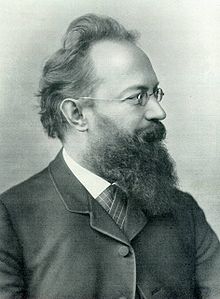Karl Emil Otto Fritsch
Karl Emil Otto Fritsch (born January 29, 1838 in Ratibor , Upper Silesia , † August 31, 1915 in Berlin ) was a German architect , editor and non-fiction author and the son-in-law of Theodor Fontane .
Life
Karl Emil Otto Fritsch was one of the founders and editors of the Deutsche Bauzeitung and co-editor of Berlin and its buildings . In 1893 his book The Church of Protestantism from the Reformation to the Present was published . He owed an honorary doctorate from the Technical University of Dresden and a professorship to his publications .
In his first marriage, Fritsch was married to Klara Köhne from 1868, with whom he had two daughters. After her death in 1877, he married the half-sister of his first wife, Anna Köhne (* 1858), in 1882. During this time he also made the acquaintance of the Fontane family. Anna Fritsch was supposed to inspire Theodor Fontane for the figure of Käthe Sellenthin in Irrungen, Wirrungen ; also Effi Briest has features Annas. After a falling out with her husband, Anna wanted to divorce him in 1895; however, before this plan could be put into practice, she became seriously ill and died two years later. Allegedly before her death she expressed the wish that Fritsch would marry Fontane's daughter Martha , which happened in 1899.
Fonts
- Protestant church building from the Reformation to the present. Berlin 1893 ( archive.org ).
- The Heidelberg Castle . In: The Gazebo . Issue 8, 1883, pp. 128–132 ( full text [ Wikisource ]).
literature
- KEO Fritsch †. In: Deutsche Bauzeitung , Volume 49, 1915, No. 71 (from September 4, 1915), supplement.
- Theodor Fontane: Letters to Karl Emil Otto Fritsch and Anna Fritsch-Köhne 1882–1898. (With a letter from Franz Schwechten to Theodor Fontane and a facsimile ; first published and edited with an afterword by Regina Dieterle; with 12 lithographs by Willi-Peter Hummel) Tabor Presse, Berlin 2006, ISBN 3-00-016249-6 .
Web links
- Fritsch's lecture on the subject of style considerations ( Memento from June 12, 2007 in the Internet Archive ) on tu-cottbus.de
- Fritsch's lecture on the subject of architecture ( Memento from September 27, 2007 in the Internet Archive ) on tu-cottbus.de
Individual evidence
| personal data | |
|---|---|
| SURNAME | Fritsch, Karl Emil Otto |
| BRIEF DESCRIPTION | German architect, author and editor, son-in-law Theodor Fontanes |
| DATE OF BIRTH | January 29, 1838 |
| PLACE OF BIRTH | Ratibor |
| DATE OF DEATH | August 31, 1915 |
| Place of death | Berlin |
